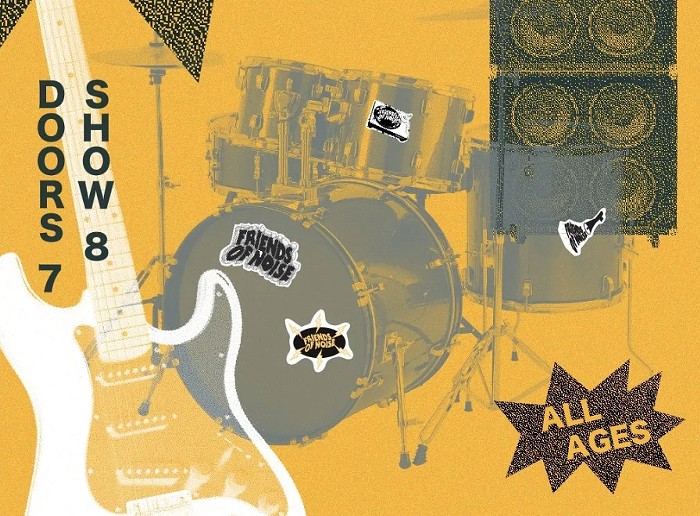Portland's songwriter, Elliott Smith, died 10 years ago on October 21, 2003. Author Lisa Wells remembers Smith, and Portland, and the not-so-distant past.
SOMETIME in the aughts, I went to a house show at the Hawthorne Mansion. It was the beginning of summer, one of the first hot days, and the crowd celebrated this arrival with a cicada-like chorus of cracking Pabst cans. Between sets, I was introduced to a young schoolteacher from the Midwest—one of many recent transplants to the city. She was a shy girl in heavy framed glasses that not only presaged the fad by years but, I assume, actually helped her to see better.
I asked the schoolteacher why she'd come to Portland. She was sun-struck and tipsy. The question seemed to make her woozier. "Well..." she said, in a small voice, "I love Elliott Smith so much... I just wanted to live in the place that inspired that music."
She hadn't been in town long enough to conceal such a sentiment, and I figured her answer was the most sincere I'd heard. It might be a bad idea to confuse the music you love with the person who made it (you know how it goes: "the enemy is within/don't confuse me with him"1), but this girl's strange impulse to conflate his songs with the place he lived made sense to me. She'd said aloud what a lot of us suspected: Elliott Smith was in the city. Even after he moved away from town. Even after he left the earth.
I spent a sizable chunk of my teen years scuffing around Portland with his music in my headphones on a loop—the inner and outer life mapped in tandem—so no big shock the two sort of melded in my mind. What was it I loved so much? Any barstool music critic has me beat on the craft talk, so I'll spare you that and speak plainly. Better, I'll let him speak.
"Being this honest can be risky," he wrote, "which, of course, is an excellent idea. It'll either be sappy or brave. Or both."2 He was writing about John Lennon's songs "Cold Turkey" and "Jealous Guy," but I think the same can be said about his songs.
Risky, sappy, brave—haunting and melodic—an excellent idea, we agree.
Sadly, a song is not a city. We can't live inside them the way they live inside of us. Musician Nick Jaina once defined the condition of melancholy this way: "The sadness of loving a song, wanting to live inside a song..."3 For most fans, it's enough to be inhabited by a song, and to be a little melancholy. For a few, this is an intolerable frustration. If they can't get inside the song, they'll try to get inside the singer.
Smith's interviews are polite, but his tone is often weary, his answers redundant. Redundant answers to redundant questions. Even his meta-commentary on the redundancy recurs: "I love having conversations with people about music, but not necessarily similar ones over and over again or only about my own music. It's pretty artificial..."4 And: "It's a problem if you're trying to get out of your own weird headspace, and you're having a lot of conversations on tour, where no matter how much you try and talk about, say, music or something, the questions are constantly redirected back to yourself and who you are. I don't think it's important who I am."5
It's a stunning quote in these days, so burdened by the maintenance of a personal "brand." Though I grew up in the '90s, I sometimes forget there was another climate, a time when rockers rejected the huckster trappings of celebrity.
Then again, maybe I misremember, for here Smith says, "I guess being in the music... um, business... or something is like being in high school where everybody is trying to be cool and you wish that you could just graduate from high school and not have to deal with all the little put-downs that people give each other and everybody trying to be the most popular guy..."6
Sound familiar?
That quote is biography enough. Smith wasn't performing when he stumbled on the word "business."
"I don't think it's important who I am."
But is it important where he was?
The more I think about it, the more I think that synesthetic schoolteacher got it right. There's a short film you may have seen online, made on 16mm back in 1996 by Jem Cohen. It's called Lucky Three and includes footage of Smith playing songs from Either/Or and walking around Portland in the rain. It's subtitled "a portrait." Whether that portrait is of Smith or of Portland or both is unclear. They blur together. It's the Portland I remember best: industrial gray, rain pooling under bridges, big concrete pylons. The yellow linoleum in the kitchen where he plays "Between the Bars," the Rodney Mullen "Rock Is King" poster tacked to the basement drywall—it all feels achingly specific to that time and place.
Riding the Google rhizome further, I come across this quote and it pretty much blows my mind: "Sometimes I think it's nice if a song can ramp up and take some twists and turns, like someone walking through a neighborhood and taking a turn into a more industrial area and then winding up in a beautiful park."7
Maybe he wasn't soundtracking my walk—wandering around the city all those years ago—so much as I was enacting his writing process. Is that why we crave knowledge of the maker? To confirm our experience of the made thing?
In any case, I'm sure by now you can tell I'm homesick.
Sometimes I drink a bunch of wine and image search "Columbia River Gorge" or "Siskiyou National Forest." Sometimes I creep on your Instagram, linger on the pictures where you're drinking beers on the Bluffs in the afternoon, or toeing your name through the sand at Hug Point, and feel envy—and something like pride.
Or else I lie on the carpet in the dark and listen to the "No Name" songs on a loop like I did when I was 15 years old. This I do embarrassingly often. Double that age and still the magical belief persists: that I can get inside the song somehow. Come home.
Lisa Wells is the author of Yeah. No. Totally. Born and raised in Portland, she currently lives in Iowa City where she's completing an MFA at the Writers' Workshop.
1. "Stupidity Tries," Figure 8, Elliott Smith ↩
2. "Elliott Smith on His Favorite John Lennon Songs," Spin, Jan 8, 2001 ↩
3. "Sadness: A Field Guide" by Nick Jaina, Eye-Rhyme, 2005 ↩
4. Elliott Smith talks to Carsten Wohlfeld, Luna Kafé, 2000 ↩
5. Talking to Marcus Kagler, Under the Radar, March 20, 2003 ↩
6. Elliott Smith talks to Carsten Wohlfeld, Luna Kafé, 2000 ↩
7. Talking to Barnes & Noble, 2000 ↩



















